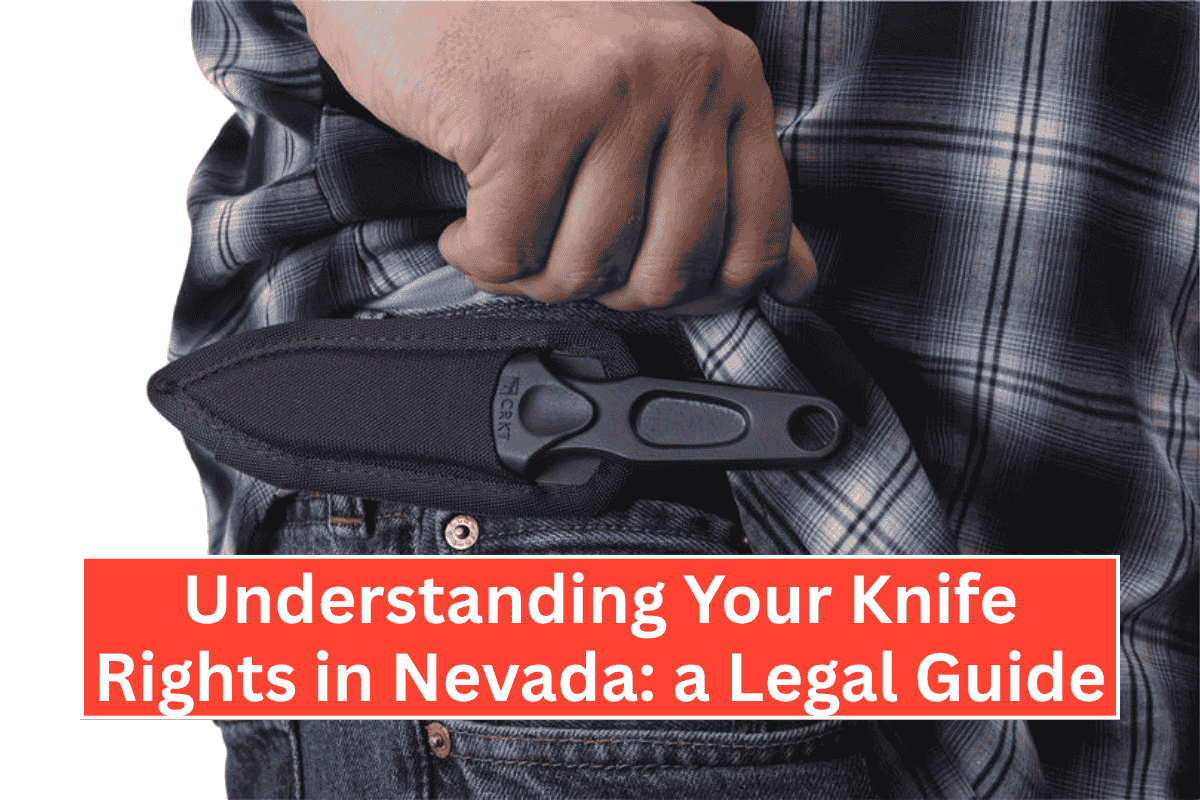Nevada really trusts its people—here you can carry almost any kind of knife, openly or concealed (with a few rules). Whether you’re out hiking, working on the ranch, or just want to keep a pocket knife handy, Nevada law is more relaxed than most.
But with freedom comes responsibility. This guide explains what knives are legal, where you can carry them, and what to watch out for—especially in places like Clark County and school zones.
Nevada Knife Laws: A Simple Overview
Nevada has one set of knife laws that apply everywhere—no confusing city rules. That makes it safe to travel across counties without worrying about suddenly breaking a law.
You can own and carry almost any knife: switchblades, butterfly knives, gravity knives, fixed blades, folding knives, hunting knives, dirks, daggers—you name it.
There’s no state rule about blade length, and open carry doesn’t require any permit. Just clip it to your belt or sheath, and you’re good.
Concealed Carry Rules: Watch for Clark County
If you hide your knife—like in a pocket or waistband—you have to know about Clark County rules. In Clark County (where Las Vegas is), carrying a concealed knife with a blade 3 inches or longer needs a permit from the sheriff. You apply through the Las Vegas Metropolitan Police Department.
Other counties don’t have this rule, and a permit from another Nevada county works statewide. It’s smart to check what county you’re in before hiding a big knife.
Places You Can’t Carry a Knife
Even in Nevada, you can’t carry knives everywhere. These places are off-limits:
- Public and private schools
- College campuses
- Child care centers
- Government buildings
- Jails and prisons
- Power plants
Bringing a knife into these places can get you in serious trouble—a gross misdemeanor that can mean up to 364 days in jail and a $2,000 fine under NRS 202.265.
Switchblades Made Legal in 2015
In July 2015, Nevada changed its law (SB 176) to allow switchblades—knives that open automatically with a button. Before that, switchblades with blades longer than two inches, plus daggers and belt-buckle knives, were banned.
Now, they’re legal to carry (open or concealed), except in school zones. Under Nevada law, a switchblade is defined as a knife with a blade longer than two inches that opens automatically by a button or similar mechanism.
Penalties for Breaking Knife Laws
Nevada is liberal about knives—but it still punishes misuse:
| Offense | Penalty |
|---|---|
| Concealed knife ≥ 3″ without permit (Clark County) | Misdemeanor: up to 6 months jail or $1,000 fine |
| Knife in a restricted zone | Gross misdemeanor: up to 364 days jail or $2,000 fine |
| Using a knife in a crime | Felony C: 1–5 years prison or up to $10,000 fine |
| Brandishing a knife | Misdemeanor: up to 6 months jail or $1,000 fine |
Brandishing means waving or showing a knife to threaten. But if you actually try to hurt someone or scare them, that can count as assault with a deadly weapon—and that’s a felony under NRS 202.320.
Home Daycare Exception
If you have a licensed child care center in your home and live there too, you can have knives at home. That’s the only exception to the rule against knives in child care centers, as stated in NRS 202.265.
Nevada’s Knife Tradition
Knives are part of Nevada’s culture—from cowboy knives on ranches to survival blades in the desert. This tradition is why Nevada has made its laws flexible: a knife is not just a tool, it’s part of life. The state trusts people to carry knives responsibly.
The Future of Knife Laws in Nevada
Nevada’s knife laws aim to respect freedom while keeping safety in mind. Instead of micromanaging blade types or lengths, the state lets you choose, with some reasonable limits for public safety. This approach makes Nevada a great place for knife collectors, outdoor lovers, and people who carry knives for daily tasks.
Nevada is one of the most knife‑friendly states in the U.S. You can carry nearly any knife, open or concealed, with only a few exceptions. Just be careful in Clark County if you’re hiding a longer blade, and never bring knives into schools, government buildings, or child care centers—unless it’s your own licensed home daycare.
This guide helps you enjoy your knife responsibly, with respect for the law and others. Remember: freedom dipped in responsibility makes the journey better.












